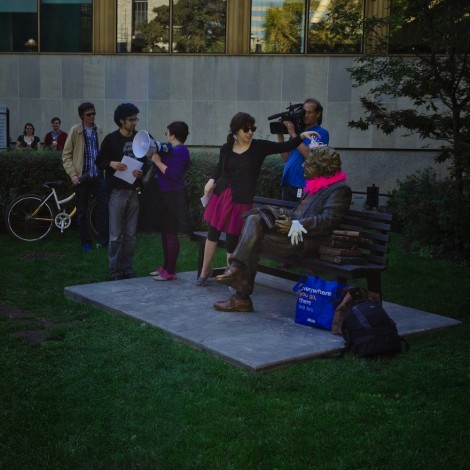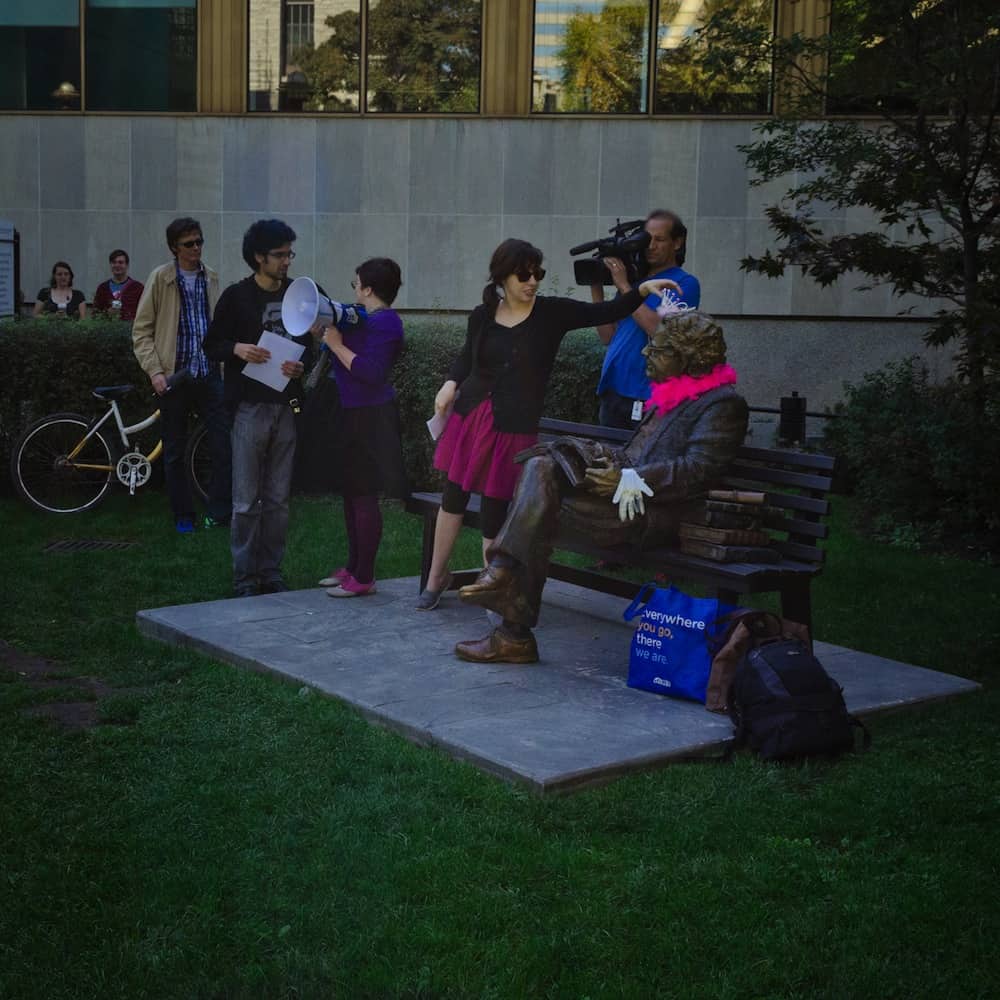
Rally attendees festooned the statue of Northrop Frye outside Victoria College. DENIS OSIPOV/THE VARSITY
Gilmour’s comments not a signal to ban professors’ opinions from classroom
The recent backlash that resulted from an interview that lecturer David Gilmour gave two weeks ago has raised some important questions about whether educators should share their opinions or keep their personal feelings to themselves. While the Gilmour scandal is a reminder that words should be chosen carefully, it should not be considered a sign that intellectuals’ personal opinions should be left out of the classroom.
To some extent, all course syllabi are representative of the tastes or opinions of the professors who created them. Gaining insight into the logic behind text choices and teaching perspectives is valuable; professors’ opinions can contextualize course material and often make a course more interesting. That being said, setting a syllabus is a privilege, and it comes with responsibility. Perhaps Gilmour’s comments provoked an inflamed response not because of what he said, but how he chose to phrase it. He stated that he only teaches works of authors he truly loves, since those are the works he teaches best. Instead of leaving it at that, a relatively unprovocative statement, he chose to further characterize his choice on the basis of gender, age, race, and sexual orientation — referring to authors that do not resonate with him in terms that could easily be perceived as discriminatory. The descriptive language that Gilmour chose was inflammatory, but his initial rationale makes sense — he teaches what he does because it is what he teaches best.
Professors should not be forced to teach subjects they have no personal interest in. If Gilmour is not passionate about female authors, then it stands to reason that his class would not be the best setting in which to be educated on them. In many ways, Gilmour’s syllabus is the product of him playing to his strengths and admitting his weaknesses.
As a female student who took David Gilmour’s first-year seminar, I enjoyed the course. Professor Gilmour actively gave his opinions and explained the choices of works through personal anecdotes and, in doing so, made the class intriguing, aggravating, and amusing. It did not matter whether you hated or loved his comments, he welcomed opinions and arguments from all of his students, even if they clashed with his own.
The courses that Gilmour teaches do not profess to be all-encompassing samples of literary greatness, and would probably be more appropriately titled: “The World According to Gilmour.” For those who cannot reconcile the value of education with the personality of the professor, the good news is that Gilmour teaches two half-year elective courses — which makes opting-out of the Gilmour experience easy for most. For those who do choose his courses, they provide a unique, albeit sometimes exacerbating, educational experience.
Exposure to conflicting opinions is part of education, and — as Margaret Atwood stated in response to the scandal — “Universities are places where many things are taught, and where free expression of opinion is encouraged.” All professors, David Gilmour included, should be free to respectfully give their personal opinions, as long as we as students remain free to express ours.
Samantha Relich is a third-year student studying criminology and political science.
David Gilmour scandal reveals holes in the university’s hiring policies
As I scrolled through my Twitter timeline the other day, one thing became abundantly clear: people are really mad at David Gilmour. Quoted in a Hazlitt interview, Gilmour said: “I’m not interested in teaching books by women”, and later, that: “If you want women writers, go down the hall.” He also spoke of his dislike for Canadian and Chinese authors, which naturally narrows down his syllabus to: “…Guys. Serious heterosexual guys. F. Scott Fitzgerald, Chekhov, Tolstoy. Real guy-guys. Henry Miller. Philip Roth.”
I currently study at Victoria College, where Gilmour is a lecturer, and have had many friends go through his classes. They speak highly of him, saying that he is quirky and brilliant — he did win the Governor General’s Literary Award, after all.
I am not angry with what Gilmour had to say, and I do not think he is racist or sexist. In his defense he just: “teach[es] the people that [he] truly, truly love[s].” I do, however, think that if there is an issue here, it is the matter of equity in the classroom.
This incident has brought to light hiring practices which do not seem conducive to the university’s own human rights’ equity policy, which supposedly “acknowledges that it conducts its teaching, research and other activities in the context of a richly diverse society.” Gilmour’s class does not acknowledge this, and the way he was hired — with a blank check for curriculum development — does not either.
Ironically, U of T is hell-bent on requiring students to fulfill “breadth requirements,” categorized mandatory classes which lead students back into the perils of math in the hope of making them more well-rounded. You would think the university would aim for the same thing regarding the diversity of opinion within the classroom: a balanced perspective of a topic.
It seems Gilmour has also forgotten about the diplomacy required of public figures like himself. His apology interview in the National Post was frankly a disaster, as he said he “Normally… actually wouldn’t” and he doesn’t, “…want [his] teaching reputation besmirched.” Amusingly, he noted that he would not “…want people not buying [his] book because they think that’s the position [he] hold[s] in the world.”
The negative light being shone on the U of T community as a whole, due to Gilmour’s actions, is upsetting. Ours is a campus where a premium is placed on equity and fairness, two values David Gilmour seemed to forget during his interview. However, the university should take something positive out of this situation and review its hiring practices in order to provide students with not only a good education, but a tolerant one — filled with different perspectives. Students will always be more engaged in a class taught by someone interesting, someone they can relate to. David Gilmour just did what he was hired to do, but then why was David Gilmour hired in the first place?
Max Stern is a second-year student studying both peace, conflict, and justice studies and Canadian studies.
Censorship in academia: is there no room for different opinions?
The recent controversy surrounding David Gilmour, an author and lecturer at Victoria College, has a number of people fuming over comments he made in an interview with Hazlitt magazine. In the world of academia, scholars are expected to spend years developing informed opinions, so it is strange that Gilmour is being reprimanded for explaining his choice of readings for his syllabus. What is even stranger is that he has not said anything overtly discriminatory.
In the interview transcript, he is recorded saying: “…when I was given this job, I said I would teach only the people that I truly, truly love. And, unfortunately, none of those happen to be Chinese, or women.” In response, some in the literary world — as well as students across campus — have characterized his remarks as being both racist and sexist.
Consider this: perhaps none of the authors Gilmour enjoys teaching are Chinese because he was never taught about any of them. With a degree in French literature, it is not hard to imagine that Gilmour has probably never learned anything about Chinese writing. How many of us, regardless of our love for diversity and literature, have a favourite piece of writing from every single racial and ethnic group in this world? Yet nobody would accuse someone of being a racist for not appreciating literature from any specific culture.
As for the alleged sexism, Gilmour never implied that female writers were inferior or incapable of producing great writing. In fact, he stated that he loves and appreciates Virginia Woolf. Gilmour’s preference for male authors is hardly suspicious; we all enjoy characters and authors we can relate to.
At one of the more contentious points of the interview, Gilmour says: “What I teach is guys. Serious heterosexual guys…Real guy-guys.” In response to accusations of homophobia, Gilmour has explained that he spoke in jest and that without context, print articles misrepresent his comments. After all, he teaches Truman Capote. In fact, even the “serious, heterosexual guys” Gilmour loves are not what most people would consider to represent the epitome of masculinity. For instance, he teaches Raymond Carver, whose stories focus on the realities of love and relationships. Exploring sensitive and emotional topics does not follow the overt, traditional masculinity Gilmour appears to be championing in the interview.
The only real mistake that Gilmour made during the interview was not choosing his words more carefully. Yes, he said that he teaches only the “best,” which implies that only white, straight men can produce top-notch work. But literature is subjective. What Gilmour, you, or I believe to be the “best” could be considered a piece of overrated garbage to another.
Gilmour and other academics are not obliged to suppress their personal opinions in public — short of outright bigotry — indeed, they should be encouraged to share their perspectives. After all, academia is supposed to be based on competing ideas.
Sophie Zhou is a second-year student studying English, history, and literary studies.


